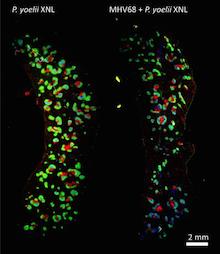
MHV68 co-infection can turn a non-lethal infection by Plasmodium parasites lethal. Image shows mouse spleens, stained with antibodies that highlight B cells (green), T cells (red), and the germinal center (blue), a part of the spleen that is important for high-affinity antibody production.
Courtesy of PLOS Pathogens via Creative Commons.
Many people who live in sub-Saharan Africa develop a natural immunity to malaria, through repeated exposure to Plasmodium parasites. Even so, the disease kills close to half a million children per year, according to the World Health Organization. What factors can interfere with the development of immunity?
Infectious disease researchers at Emory are calling attention to a trouble-maker whose effects may be underappreciated: Epstein-Barr virus (EBV). Their experiments with mice show that co-infection with a virus closely related to EBV can make a survivable malaria parasite infection lethal.
The results were published May 21 in PLOS Pathogens.
In children, EBV infection is regarded as "not distinguishable from other mild, brief childhood illnesses," although it can cause infectious mononucleosis in adolescents and young adults. Children in sub-Saharan Africa become infected by Epstein-Barr virus in infancy. Within the same time period, they become susceptible to Plasmodium parasite infection because protective antibodies from their mothers fade away.
"Where we think kids get into trouble is when both infections are happening at the same time, because case reports show EBV can produce a weeks-long suppression of the immune system," says co-senior author Tracey Lamb, PhD, assistant professor of pediatrics at Emory University School of Medicine.
The first author of the paper is Microbiology and Molecular Genetics graduate student Caline Matar. Co-senior author Sam Speck, PhD, professor of microbiology and immunology, is a Georgia Research Alliance Eminent Scholar.
Matar and her colleagues studied mice infected by Plasmodium yoelii, which is usually non-lethal because the mice develop antibodies that control the parasites. Co-infection by MHV68 (murine gammaherpesvirus 68), a close relative of EBV that infects mice, made P. yoelii lethal to the mice. However, mice that have entered the chronic phase of MHV68 infection (several weeks to months after primary infection) were not affected. Matar’s experiments indicated that MHV68 infection hinders the immune system in developing antibodies against P. yoelii.
"These results are part of a pattern of evidence suggesting that clinicians treating severe malaria should check for acute EBV co-infection, and that ongoing malaria studies should include EBV as a potential risk factor for more severe forms of the disease," Matar says.
Some diagnostic tools are available to track EBV infection, but there is no EBV vaccine. Although there are no drugs approved specifically for EBV, some studies show that antiviral drugs such as acyclovir can be effective against it.
"This phenomenon may not be unique to EBV, and that infections with other pathogens may also exacerbate malarial disease since many pathogens have the capacity to suppress various components of the host immune response," Speck says.
The research was supported by the National Institute of Allergy and Infectious Diseases (R21AI099847) and a pilot grant from the Queensland-USA Technology Alliance.
